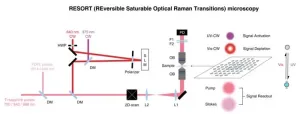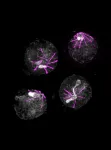(Press-News.org) HOUSTON ― Researchers from The University of Texas MD Anderson Cancer Center found the KRAS G12C inhibitor adagrasib showed promising activity suppressing cancer growth not only within the lungs but also in brain metastases for patients with KRAS G12C-mutated non-small cell lung cancer (NSCLC).
Findings from the Phase Ib cohort of the KRYSTAL-1 trial, published today in the Journal of Clinical Oncology, represent the first prospective data of anti-tumor activity from a KRAS G12C inhibitor in brain metastases, providing continued evidence of the drug's efficacy.
The targeted therapy showed an intracranial disease control rate of 90%. Additionally, researchers observed a 42% objective response rate (ORR) in shrinking tumors within the brain. The median intracranial progression-free survival (PFS) was 5.4 months, while the median overall survival (OS) reached 11.4 months.
“Patients with brain metastases from KRAS-mutant lung cancer face a poor prognosis,” said study lead Marcelo Negrao, M.D., assistant professor of Thoracic/Head and Neck Medical Oncology. “The data indicate adagrasib may offer patients a good chance of seeing response in the brain without needing additional therapy, such as radiation.”
KRAS mutations occur in approximately 25-30% of NSCLC cases, with the KRAS G12C mutation accounting for around 13% of these instances. While radiation therapy and surgery historically have been utilized to treat brain metastases, targeted drugs with central nervous system (CNS) penetration continue to demonstrate encouraging efficacy for treatment of brain metastases.
Adagrasib targets the mutated KRAS protein, inhibiting its ability to promote abnormal cancer cell growth. The drug has obtained approval from the Food and Drug Administration for the treatment of advanced KRAS G12C-mutant NSCLC in adult patients who have not responded to standard systemic therapy.
This study included 25 patients with KRAS G12C-mutated NSCLC and untreated CNS metastases from the Phase Ib portion of the ongoing KRYSTAL-1 trial. Most participants were female (52%) with a median age of 66 years and a predominant ethnic representation of individuals identifying as white. Participants were given oral adagrasib at a 600 mg dose, twice daily.
The systemic ORR in these patients was 30%. Median intracranial duration of response was 12.7 months. 37% of patients in the study saw progression of brain metastases, and only two patients saw progression in the CNS alone. Results also reveal adagrasib continues to exhibit a manageable safety profile, with only a few CNS-specific side effects reported. These include altered taste and dizziness, both consistent with previous reports from the KRYSTAL-1 trial.
"Adagrasib is the first KRAS G12C inhibitor to prospectively demonstrate intracranial activity in patients with KRAS G12C-mutated NSCLC and untreated brain metastases,” Negrao said. “These findings support continued clinical development of adagrasib and of its combinations for patients with KRAS G12C-mutated NSCLC.”
This study was sponsored by Mirati Therapeutics, Inc. A full list of collaborating authors and their disclosures can be found with the full paper here.
Read the full release on the MD Anderson newsroom.
END
Adagrasib effective for patients with KRAS G12C-mutant lung cancer and untreated brain metastases
Targeted therapy is first KRAS G12C inhibitor to demonstrate intracranial responses
2023-06-16
ELSE PRESS RELEASES FROM THIS DATE:
ACQUIRE therapy framework shows results for intensive pediatric rehabilitation
2023-06-16
Virginia Tech researchers with the Fralin Biomedical Research Institute at VTC have demonstrated that children with a wide range of diagnoses that affect their motor function improve after receiving intensive pediatric neurorehabilitation called ACQUIRE Therapy.
The findings were published in June in Behavioral Sciences and will be included in an upcoming special issue of the journal devoted to “shifting the therapeutic paradigm for children with neuromotor disabilities to maximize development.”
“We ...
New research shows HIV can lie dormant in the brain
2023-06-16
As a part of its life cycle, the human immunodeficiency virus-1 (HIV) inserts a copy of its DNA into human immune cells. Some of these newly infected immune cells can then transition into a dormant, latent state for a long period of time, which is referred to as HIV latency.
Although current therapies, such current antiretroviral therapy (ART), can successfully block the virus from replicating further, it cannot eradicate latent HIV. If treatment is ever discontinued, the virus can rebound from latency and reignite the progression of HIV infection to AIDS.
Scientists from the HIV Cure Center at the UNC School of Medicine, University of California ...
For resistant breast cancers, two drugs may be better than one
2023-06-16
Cancer cells are even smarter than scientists previously believed, according to new CU Boulder research. When these cells are confronted with potent new drugs called CDK2 inhibitors, which are designed to prevent cancer from proliferating, they can trigger a workaround to survive the assault in as little as one to two hours.
But the study, published June 8 in the journal “Cell,” comes with a silver lining.
It reveals how cancer cells complete this adaption and shows that simultaneously administering a second, already widely ...
UMass Amherst biostatistician developing statistical tools to predict breast cancer survival and inform targeted therapies
2023-06-16
Breast cancer is a complex disease, and its progression is difficult, yet important, to predict.
While many elements may contribute to a breast cancer prognosis, University of Massachusetts Amherst biostatistician Chi Hyun Lee has zeroed in on one risk factor that has emerged for its potential to predict the disease’s progression.
Lee will use a two-year, $154,791 grant from the National Institutes of Health (NIH) in an effort to develop statistical tools that will better predict breast cancer survival rates and survival time after breast cancer recurrence.
While the project focuses on breast cancer research, the proposed statistical ...
Jefferson Lab outreach efforts earn national recognition
2023-06-16
NEWPORT NEWS, VA – When the global pandemic put the kibosh on in-person events, the U.S. Department of Energy’s Thomas Jefferson National Accelerator Facility sought alternatives for ensuring its world-class science and unique equipment remained accessible. These efforts culminated in the Fall for Science Virtual Field Trip Event, which rolled out a virtual tour experience, new website, and unique supporting materials. Now, the event has been recognized by the Public Relations Society of America with three Anvil Awards.
According ...
Uncovering a cellular process that leads to inflammation
2023-06-16
Cedars-Sinai investigators have identified several steps in a cellular process responsible for triggering one of the body’s important inflammatory responses. Their findings, published in the peer-reviewed journal Science Immunology, open up possibilities for modulating the type of inflammation associated with several infections and inflammatory diseases.
Specifically, the investigators have improved understanding of the steps that lead to the production of IL-1 beta, a potent inflammatory protein signal released during many inflammatory responses.
“We now have a clearer understanding of the stepwise process that leads to the production of IL-1 beta,” said Andrea ...
New imaging technique is no last resort
2023-06-16
There are various ways to image biological samples on a microscopic level, and each has its own pros and cons. For the first time, a team of researchers, including those from the University of Tokyo, has combined aspects from two of the leading imaging techniques to craft a new method of imaging and analyzing biological samples. Its concept, known as RESORT, paves the way to observe living systems in unprecedented detail.
For as long as humanity has been able to manipulate glass, we have used optical devices to peer at the microscopic world in ever increasing ...
Abnormalities in neurodevelopment could lay the foundations for Alzheimer’s disease
2023-06-16
In the cerebral cortex, neurogenesis – the formation of neural cells from stem cells – begins in the fetus from 5 weeks gestation and is almost complete by 28 weeks. It is a complex process with finely tuned mechanisms. “In humans, neurogenesis lasts particularly long compared with other species, explains Khadijeh Shabani, a post-doctoral researcher at Paris Brain Institute. Neural stem cells remain in a progenitor state for an extended period. Only later do they differentiate into glial cells, astrocytes, or oligodendrocytes that will form the architecture of the brain and spinal cord.”
Until ...
Disorient the malaria parasite to prevent it from causing harm
2023-06-16
With almost 250 million cases a year, 621,000 of them fatal, malaria remains a major public health problem, particularly in sub-Saharan Africa. Malaria is a parasitic disease transmitted by mosquitoes and caused by a microbe of the genus Plasmodium. On its journey from mosquito to human, Plasmodium must adapt to the specificities of the many organs and cells it parasitizes. Microbes do not have sensory organs; instead, they have sensors made of proteins to detect molecules specific to the environments they colonize. While most living organisms share the same types of sensors, Plasmodium is an exception. Biologists at the University of Geneva (UNIGE) have identified a new type ...
Growing number of hypothyroidism patients receiving treatment other than levothyroxine
2023-06-16
The use of thyroid hormones other than the commonly prescribed hormone medicine levothyroxine to treat hypothyroidism, or underactive thyroid, is increasing, according to a study being presented Friday at ENDO 2023, the Endocrine Society’s annual meeting in Chicago, Ill.
“This is significant because the long-term health outcomes of these treatments are not as well known as levothyroxine,” said researcher Matthew Ettleson, M.D., of the University of Chicago in Chicago, Ill.
The thyroid makes the hormones triiodothyronine ...
LAST 30 PRESS RELEASES:
Jeonbuk National University researchers explore metal oxide electrodes as a new frontier in electrochemical microplastic detection
Cannabis: What is the profile of adults at low risk of dependence?
Medical and materials innovations of two women engineers recognized by Sony and Nature
Blood test “clocks” predict when Alzheimer’s symptoms will start
Second pregnancy uniquely alters the female brain
Study shows low-field MRI is feasible for breast screening
Nanodevice produces continuous electricity from evaporation
Call me invasive: New evidence confirms the status of the giant Asian mantis in Europe
Scientists discover a key mechanism regulating how oxytocin is released in the mouse brain
Public and patient involvement in research is a balancing act of power
Scientists discover “bacterial constipation,” a new disease caused by gut-drying bacteria
DGIST identifies “magic blueprint” for converting carbon dioxide into resources through atom-level catalyst design
COVID-19 vaccination during pregnancy may help prevent preeclampsia
Menopausal hormone therapy not linked to increased risk of death
Chronic shortage of family doctors in England, reveals BMJ analysis
Booster jabs reduce the risks of COVID-19 deaths, study finds
Screening increases survival rate for stage IV breast cancer by 60%
ACC announces inaugural fellow for the Thad and Gerry Waites Rural Cardiovascular Research Fellowship
University of Oklahoma researchers develop durable hybrid materials for faster radiation detection
Medicaid disenrollment spikes at age 19, study finds
Turning agricultural waste into advanced materials: Review highlights how torrefaction could power a sustainable carbon future
New study warns emerging pollutants in livestock and aquaculture waste may threaten ecosystems and public health
Integrated rice–aquatic farming systems may hold the key to smarter nitrogen use and lower agricultural emissions
Hope for global banana farming in genetic discovery
Mirror image pheromones help beetles swipe right
Prenatal lead exposure related to worse cognitive function in adults
Research alert: Understanding substance use across the full spectrum of sexual identity
Pekingese, Shih Tzu and Staffordshire Bull Terrier among twelve dog breeds at risk of serious breathing condition
Selected dog breeds with most breathing trouble identified in new study
Interplay of class and gender may influence social judgments differently between cultures
[Press-News.org] Adagrasib effective for patients with KRAS G12C-mutant lung cancer and untreated brain metastasesTargeted therapy is first KRAS G12C inhibitor to demonstrate intracranial responses







